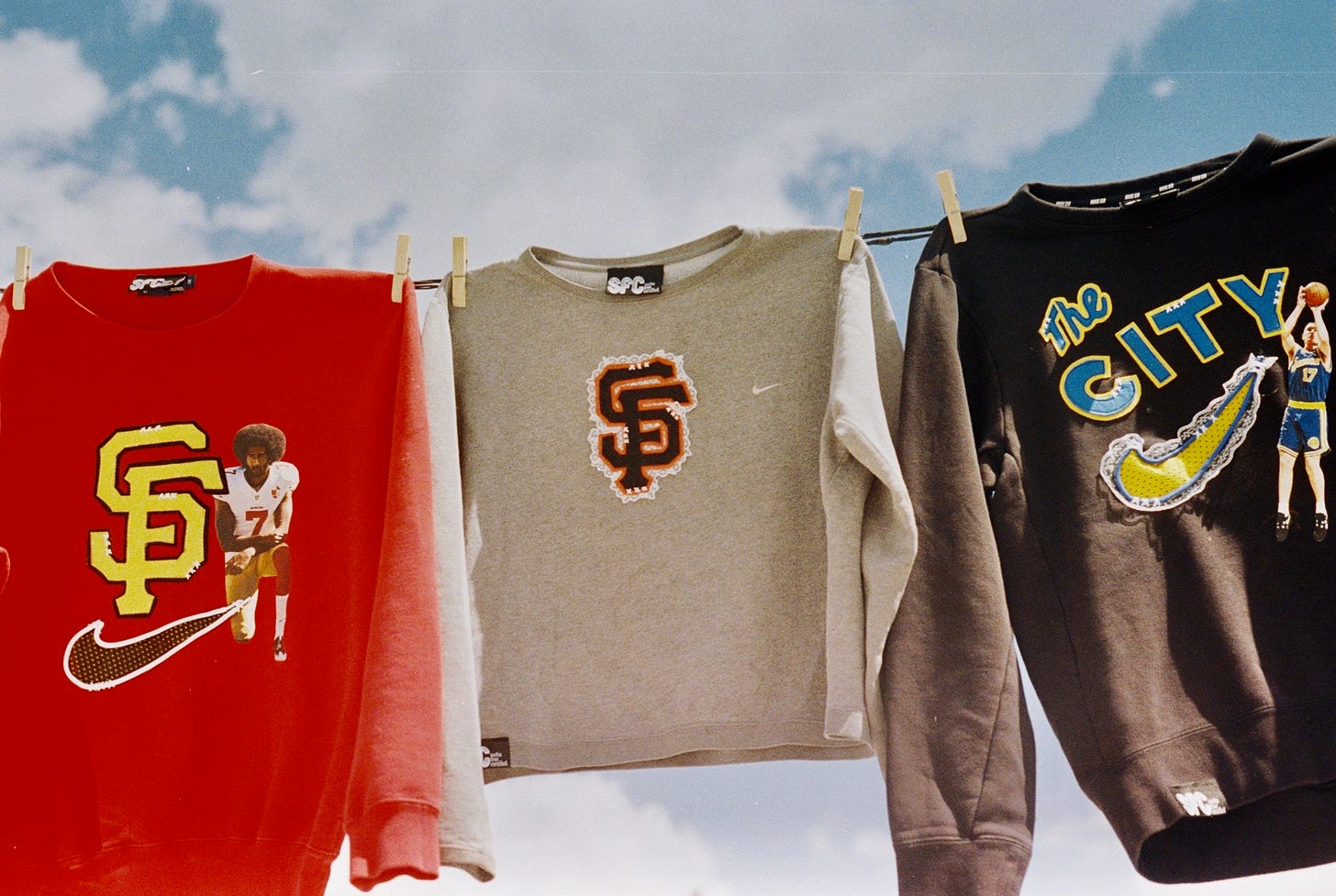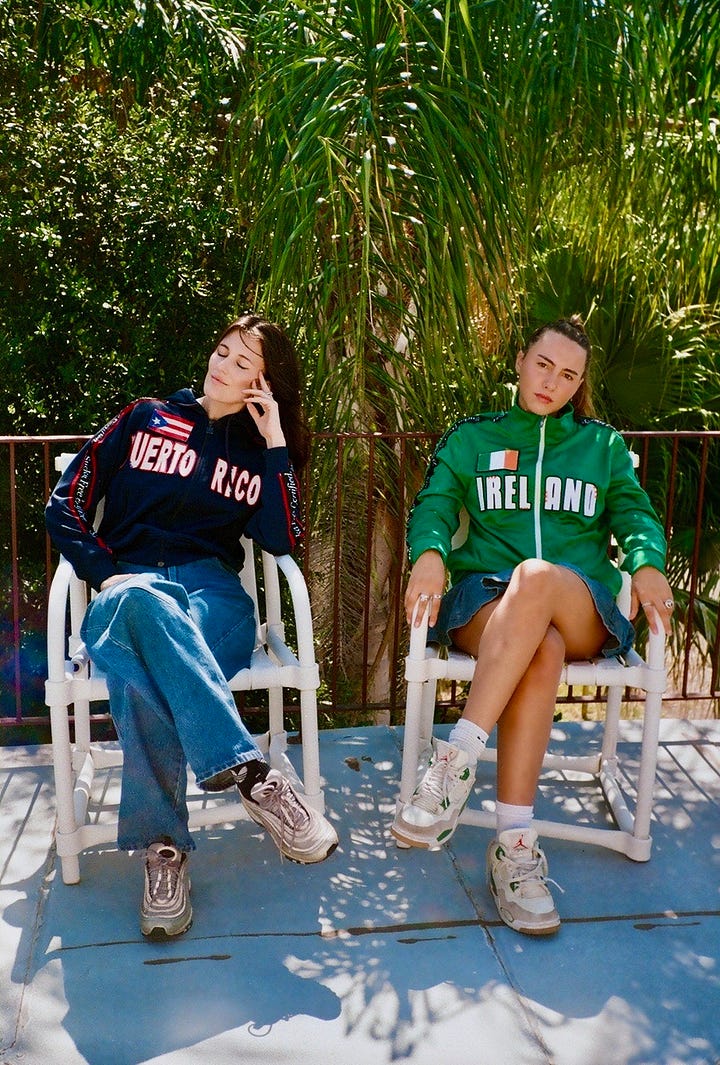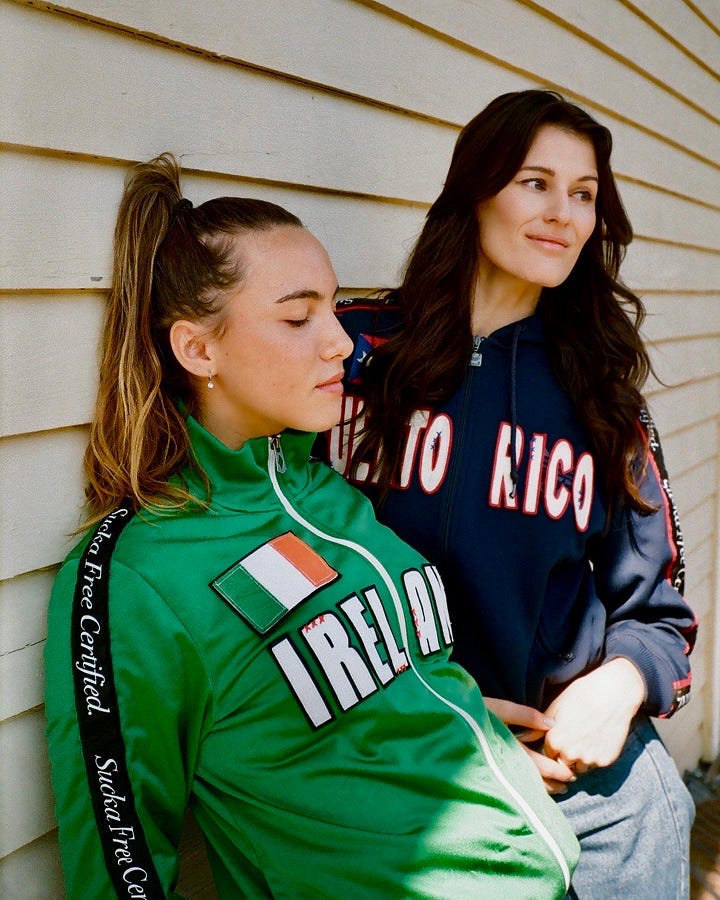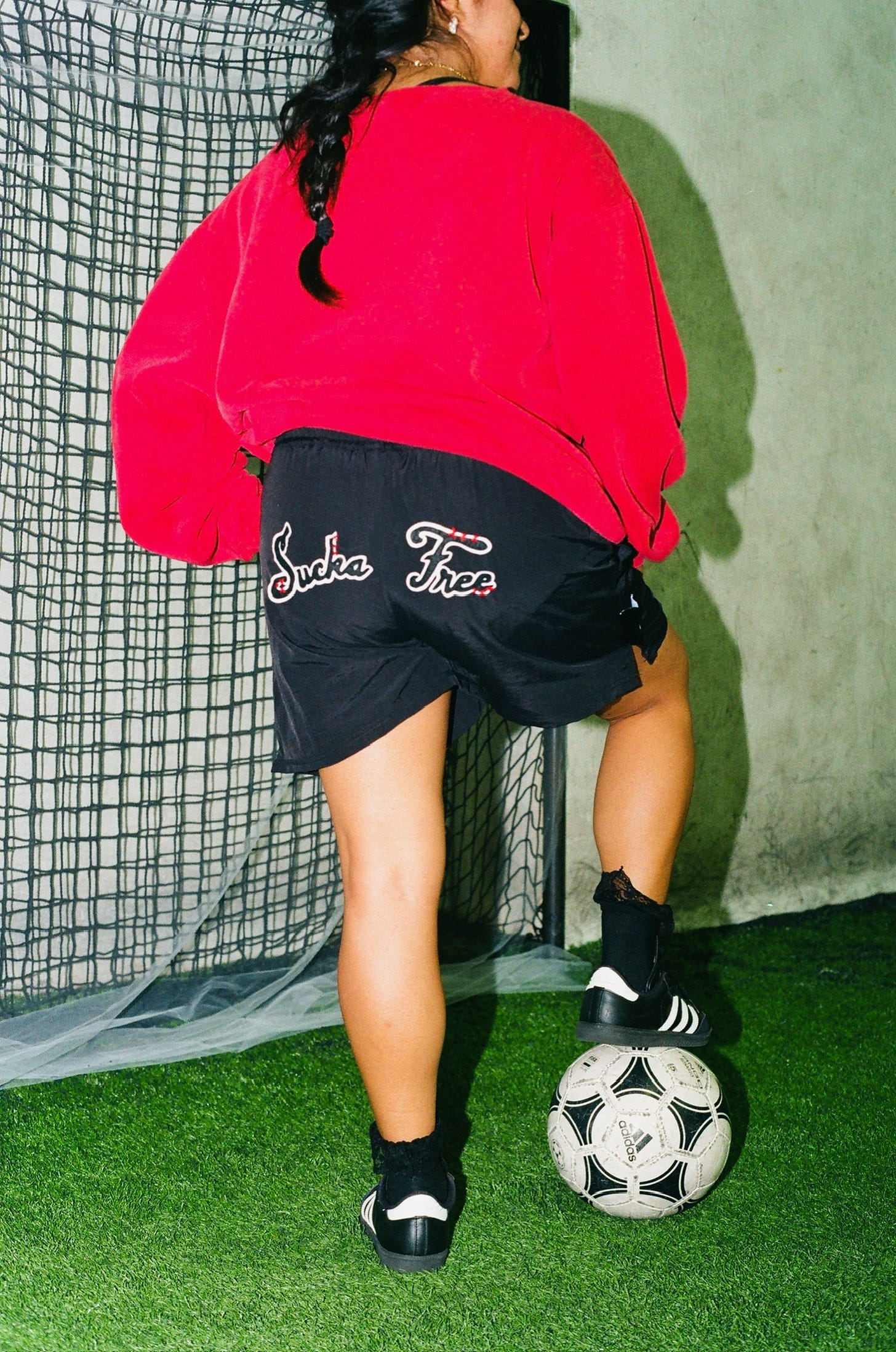Pilar O'Connor Wants You to be Proud
Of where you come from, who you are, and what you love to do.

When I think of Pilar O’Connor, I think of lacrosse socks. Those bright, mid-shin Adrenaline ones that were the most coveted item at any summer lacrosse tournament, worn as high up on the shin as humanly possible. I was on set for my second-ever shoot for my college fashion magazine, and Pilar, who was a senior when I was a freshman, walked into the studio exuding such assuredness, those lacrosse socks scrunched up above her sneakers. I was so nervous, but her smile, as well as her socks—and how effortlessly she repurposed them with her outfit on that day—put me at ease. She made those socks, which I had long considered part of a past I was certain to never encounter again, seem incredibly cool.
The socks were a symbol of a sport we had both played as teenagers, an instant icebreaker for me at that moment. But it felt important to me that she hadn’t pulled them up, that they were worn so casually and fit her personal style so well. They weren’t stretched up to their absolute limits, ready for a first face-off. They were simply part of Pilar, the then-college senior who was learning how to combine her creative wheelhouse with her deep roots in athletics.
Pilar is a joy, a multi-hyphenate, a fellow Scorpio, and a product of all her life experiences; from competitive California soccer to a graphic design degree from Boston University. She said that it’s taken her some time to figure out the balance between the numerous things that make Pilar “Pilar,” but she’s extremely proud of all of who she is. And with her clothing brand, Sucka Free Certified, she wants you to be, too.
Zoe Allen: The first Sucka Free Certified collection that you launched was in October 2020, about six months after the start of the COVID-19 pandemic. I hate bringing things back to COVID, but how much of the project do you think was the result of that time period when people didn't really know what to do? I had no idea what to do to pass my time. And how much of it was something that was kind of in the works before you went home or stayed home?
Pilar O'Connor: I had the idea previously, but I executed the idea strictly during that time during COVID. I think it was super crucial to basically concept the brand. I had graduated the May before, and then I had an internship at Nike. They had a really awesome, in-house studio, where they had a bunch of sewing machines and a bunch of fabric available to use. I made a bag for one of my projects, and I made these little acrylic stickers and put them on the bag, essentially. And I had so much fun with it.
I had grown up sewing. My older cousin taught me when I was 10, or even before that, so I had this skill, but I hadn't used it in a while. When I was really little, I would make clothes for myself, like my graduation dresses and stuff. So when I had this Nike internship and I was exposed to, you know, kind of being in this space that was super creative, I was really excited to be sewing again. I started my freelance graphic design when I moved to New York after that internship, and around January 2020, when I was at this one agency, I had some downtime in my day and just started to throw together a concept deck for this potential brand. I don't even think it had a name yet. COVID hit in March, I flew back home to San Francisco in April with this nameless brand in the back of my mind. I was really about this idea of making a sportswear brand around the idea of having pride in where you're from, which is how I thought of the name "Sucka Free Certified."
"Sucka Free" is a nickname for San Francisco. It's referenced a lot in 90s hip-hop, people would say "I'm in the Sucka Free," and my dad's Instagram handle is literally "mocinthesuckafree." Then I thought "Certified" was the perfect ending, and I just was like, "That sounds good." And then I kind of started to think of a logo. The current logo references the 1986 World Cup in Mexico City, but lately, I've been thinking about re-branding.
ZA: Do you think a new logo would still reference a sports event?
POC: Probably, probably.
ZA: There's so much to pull from visually there. When all of these sorts of things come up, like the World Cups every four years, you see people bring back up the old kits and the old logos and places because they're so much better than a lot of what is being made now. Like the 2026 World Cup logo that was released a little bit ago, everyone's like, "Wait, we had so much to reference, to build on, why is this like, so silly looking?" I'm going to show you a picture of it after because it's just so silly.
You talked about your dad and the "mocinthesuckafree" thing. I didn't know that it was the nickname for San Francisco. So yeah, it's...
POC: ...Funny! I feel like when I say that, people don't know that. It makes me think, "Oh, I should I should make that point."
ZA: If someone asks, you have a cute story to tell them, like you just told me. Back to your dad a little bit. I know that when you originally started you were doing it with your sister because you were home. You also said that the core value of the brand is having pride in where you're from. How important is family and community in this process? Your products are always modeled by your friends and photographed by you or your friends. The concept was executed with your sister originally. One of the latest collections featured both your sisters as models.
POC: I definitely started it with my sister because I was home with her during COVID. And she's way younger than me. She was in early high school then, and when I told her the idea, on the spot she was like "Let's make them right now." She was the one who helped me execute. She and my older sister were probably the first people to whom I voiced the idea, and then we made the first sweater and showed it to my dad, my stepmom, and my mom. As I continue making products, either one of my sisters, usually Iris, the younger one, is my first eye on anything. Having their ears and then also having their eyes to show my authentic opinion and story is so important to me.
I recently introduced a new style, the track jacket. You always see like, the "England" or "Italia" track jacket.
ZA: And you don't see them coming in the style of a lot of other countries. Girls at vintage stores love that little "Italia" track jacket, I guess.
POC: You never see them in other countries! My dad's Irish, my mom's side is Puerto Rican and so I really wanted to make a jacket for both of the countries that I have family.
My sisters and I went to New Orleans for the weekend, because we saw Beyoncé...it was so fun. And so I told them that I just finished these jackets, that I would bring them and that I wanted to take some photos of the two of them in the jackets. It'll be super low-key, I just wanted some greenery in the background, and for them to just sit casually on a sunny day. That was my general concept. I had thought about how I wanted to style the rest of their outfits, I brought specific shoes on the trip for them. I just knew the photos were gonna be sick, and my sisters were just like, "Whatever."


ZA: I remember seeing it for the first time and thinking how amazing it was that it was your sisters wearing that project specifically.
POC: It just felt right. Originally, I kind of wanted to be in it too.
ZA: If you would have been in it, you would have had to bring a third jacket. What jacket would that have been?
POC: My older sister and I are Irish and Puerto Rican and my younger sister is Irish and Mexican. So it would have been her wearing a Mexico one, which I have yet to make. That's still in my rolodex.
ZA: What have been your favorite to make so far?
POC: I made a New Jersey custom, which was so fun because I had never seen the New Jersey flag before.
ZA: I have never thought about what the New Jersey flag looks like.
POC: I was like, “hell yeah.” Like Jersey pride is real. And it's cool.
ZA: That's what you're trying to instill in people. Pride of where they're from.
POC: With Jersey, in particular, people are always like, ashamed of being from there. It's so cool to me when people are really proud.
ZA: It's either they're ashamed, or it's the hill they're willing to die on. People have maybe a little too much pride to be from Texas. I've definitely felt that sense of pride more after I left, which is what I think resonates with me so much about your brand. A lot of the people who are wearing the designs that you make don't live in the city that they're repping, it's more to keep their city close to them. To go back to the idea of community, do you think there's something special within sports creatives that like allows for such collaboration and community? And is that something that draws you to create within that community?
POC: I guess it's more so just the communities that I'm in. I play soccer and I skate and then I grew up playing other sports. Usually, my friends also have similar interests within those areas, or I'll befriend people. I feel like it's a very natural progression and I love, love, love how I'm staying super creative and stimulated right now trying to collaborate with my friends. In the past, I was maybe seeking approval or validation from a job title or from an organization. Now I feel like I'm just more comfortable with who I am and more confident in what I can bring to the table creatively.
My homies are so sick, we are all creative and we all want to make things. So it's like, why don't we just do that together? I love having SFC because sometimes I'll have an idea and I can use SFC as a vessel to put the idea through. Or if a friend wants to commission me for a logo, like you did. Usually, it's for friends who have a sports interest in some way just because naturally a lot of the people I surround myself with do have that interest.
ZA: How much do you think growing up playing sports shaped you and your creative spirit? I grew up playing sports, but I was never great at them. My sister was always way more athletic. Regardless, I learned so much about community through sports and lessons like what it means to be unselfish. Sports can be such a creative thing even on the field, you see athletes being called artists by commentators. I would just love to hear about your experience with sports, playing sports, and watching sports growing up in San Francisco.
POC: Playing sports and watching sports were different for me. I played soccer every day and I loved it until I got really burnt out. I always had such an interest in my personal style, and like I was saying, I grew up sewing as well and making my own clothes. I always had that interest in me, but I didn't have the tools yet to necessarily pursue that. And all of my time was going into soccer. So I was way more technically skilled in soccer than in my design or creative half. I eventually got pretty burnt out on soccer and was really craving the creativity to the point where I essentially cut soccer out of my life. I only focused on design for like all of college, and I eventually had a lot of projects that brought sports back into my life.
ZA: Like your senior thesis.
POC: Exactly. My senior thesis was on inequality and women's soccer and timed up with the 2019 Women's World Cup. It was super cool, timing-wise. I was so into that at the time, but I guess my design work was super inspired innately by my sports interests because it's a part of me. Now I have a totally different relationship with playing soccer, a much healthier place with it.
I also started skating around the same time I started SFC, which was another thing that I always wanted to do. In San Francisco, all my guy friends skated, it consumes a lot of life over there. And then kind of through finding, being obsessed with this new sport, I refound my love for soccer again, because I was like, “Okay, I can do this physical thing.” This time, knowing how to be healthy, have it be healthy, and have it be humbling.
ZA: We can be multi-dimensional!
POC: Many of my friends that I've met through skating are innately very similar to me in the way that they're super creative and multi-dimensional. By meeting a lot of people so naturally, I've then been able to be more comfortable and feel like I can be doing a sport and not take it so fucking seriously. Now I'm at a great, cohesive time where I'm playing soccer once or twice a week, and I'm skating about two to three times a week. The combination is really great. There's so much room to create, there's so much room for improv. You can be you can just be so free and creative with your body in both skating and soccer. Like when you see people fucking dancing with the ball. It's just so fun. When I'm in that mood and that groove the feeling is really freaking great. There's no better feeling and I think then you meet other people through these sports, who are innately like that as well. Most of the projects that I've been the proudest of have come out of relationships from these sports.
ZA: You were talking about your earlier relationship with soccer and how you felt like you couldn't be multi-dimensional. I'm thinking about the people that I met through helping you with your shoot in July and how all of you are so multi-faceted, coming from these really intense soccer-playing backgrounds, and having to relearn what that sport means to you. You've all figured out how to incorporate soccer, something that was so all-consuming, into a beautiful product that other people can consume. It was—it is—amazing to me.
POC: It's honestly just so fun to have friends to collaborate with and girlfriends who are interested in the same thing. It feels like I've been looking for this forever and I finally feel like I'm doing it with my genuine besties.
ZA: That makes my heart so warm and happy because I love watching sports, I love sports culture so much because of that community that you find from it and the way it brings people together.
POC: That's my favorite thing about it.
ZA: When I went to college, kind of like you, I focused on other things for a super long time. One day I thought, "Wait, I really miss talking to people about this and participating in this." I feel so much happier and like my genuine self now that I am engaging with my love of sports again, so it makes me really happy to hear you feel the same.
My last question for you is about the future of SFC because that's what the last question always has to be [laughs]. The answer doesn't have to be anything crazy or beyond what it is to you right now. But if you could do anything you want, what direction would you want the project to go in? Where do you want to see it go from here?
POC: I'm really thinking a lot about this question personally right now, in my own time, and trying to ask myself honest and hard questions about that. I want to continue to grow SFC because I still feel so passionate about what it's about and who it's for. Right now, I source secondhand pieces that I upcycle, and really just embellish with my hand-cut and sewn designs. I would love to try to get more into garment making, I think I want to go into that direction a bit more. I'm gonna do a collab project with two of my friends’ brands’. One is called Nayf and Wavey and the other is called DAÏZY. Nayf and Wavey is done by my friend Joana, who is a super talented seamstress, essentially. She makes all her pieces, which are largely inspired by skating, completely by hand and I can learn a lot—I want to learn a lot from her. My other friend, Natalie, runs DAÏZY, which is way more crochet and knitwear-inspired. In her words, it’s “not your grandma’s squares.” Hers is less skating-specific, but I’m sure some aspects of what we make will be skate-inspired.
ZA: Wear it to skate, wear it do whatever else you can think of.
POC: Exactly right. I would want to do more skate apparel and garment apparel, potentially…I'm still very much figuring that out. But I'm trying to follow my interests and follow the people that I've genuinely connected with and my community and how we can work together because my favorite things have come out of that.
ZA: Just growing with it as it as it grows. I feel weird asking that question because I was just talking with you about how I'm not taking Laced Up that seriously so that I can just enjoy it. What I'm doing here is different than Sucka Free Certified, but when I take it a bit less seriously, especially starting out, it feels like there's less pressure and I can just purely enjoy it.
POC: I've been doing this now since 2020, it's about to be 2024. That's how I've thought about it for the past three years and now I'm finally starting to think more about scalability. I've been very content with where it's been, though. And I've also been simultaneously trying to put so much of my time into my graphic design career. As I've been doing this simultaneously with other things in my life, like my graphic design career, my skating, and soccer, SFC has been one of the things in my life that I've actively been putting energy into, but I haven't had like a huge dream for it. Now that it's years into the project and I'm still into it, I'm thinking that maybe I should be putting more time, energy, and dreams into it. At the end of the day, I still just love sewing, and l love making things with my hands, for my people, for my community.
Pilar created my Laced Up logo, which I’m obsessed with. She is available for freelance projects via email and for custom Sucka Free Certified goodies via Instagram DM.







